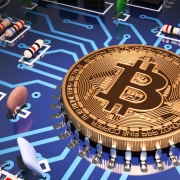Sorry Paul Krugman, Cryptocurrency and Blockchain Are the Future
Economist Paul Krugman has made no attempt to hide his skepticism about cryptocurrency and blockchain technology over the last several years. In 2013, he even penned an article titled “Bitcoin is Evil” in which he lambasted the cryptocurrency as a weapon created by libertarians with the specific intention to disrupt the central banks. And while the latter may be at least partially true, Krugman’s arguments against Bitcoin always sound more like the rantings of jealous schoolboy left out of an inside joke than that of an economist.
And yet, no matter how much Bitcoin, blockchain, and other cryptocurrencies have proven their worth, Krugman still chooses to condemn and dismiss them. In his latest attack, he accuses Bitcoin of setting the monetary system back by 300 years. While Bitcoin has arguably launched the economy into a future where currency is digital and free from government intrusion, Krugman’s fears ultimately boil down to a fear of a decentralized economy.
Past or Future?
When he speaks of setting the monetary system back 300 years, Krugman is referring to a time when money was backed by gold and other precious metals rather than the government’s word. This, of course, made it much harder for central planners to manipulate the money supply as they could only circulate currency that could be backed by something physical.
While this is preferable to those of us who believe that money should have intrinsic value, Krugman disagrees. And he views this affection for gold-backed currency as nothing more than irrational nostalgia. In fact, he believes that real monetary innovation came about when we abandoned gold-backed currency in favor of fiat money— a “milestone” he attributed to the rise of central banks.
He even goes as far as to say that government-issued currency is more legitimate than cryptocurrency simply because the government is more trustworthy than the unknown creator of Bitcoin. In his new article he states:
“Banknotes worked because people knew something about the banks that issued them, and these banks had an incentive to preserve their reputation. Governments have occasionally abused the privilege of creating fiat money, but for the most part governments and central banks exercise restraint, again because they care about their reputations.”
I am not sure what planet Krugman is living on, but the government is constantly meddling with our money supply. In fact, this is precisely why major financial crises arise in the first place. And every time their intervention goes horribly wrong, they use taxpayer dollars to bail out “too big to fail” entities. And it this behavior that has led so many people to distrust government-backed currency and opts for a more decentralized option.
Decentralization is the Future
While gold-backed currency and cryptocurrency are very different, they both make it harder for central planners to manipulate the money supply. When each paper dollar must be backed by gold or another precious metal, you have a fixed supply. The same is true of Bitcoin, which has a set number that can be mined. But Krugman doesn’t like being bound by these rules and believes that fiat currency has value simply “because men with guns say they do.”
He writes:
“But you’re supposed to be sure that a Bitcoin is real without knowing who issued it, so you need the digital equivalent of biting a gold coin to be sure it’s the real deal, and the costs of producing something that satisfies that test have to be high enough to discourage fraud.”
Instead of creating something as complex as the blockchain, where each transaction is anonymous, verified to prevent double spending, and then placed on the public ledger, Krugman thinks we need only trust that those in power are virtuous and know what is best for us.
And by creating a decentralized system where individuals no longer have to rely on governments to issue mediums of exchange, he believes we are returning to the dark ages of monetary policy. In other words, he fears we are moving into a future where central planners are losing control of the monetary system. And while most Keynesian economists inherently fear a world that they do not imagine they can control, many individualists have cause for celebration.
He states:
“…cryptocurrency enthusiasts are effectively celebrating the use of cutting-edge technology to set the monetary system back 300 years. Why would you want to do that? What problem does it solve? I have yet to see a clear answer to that question.”
While it may not be obvious to Krugman, Bitcoin’s appeal comes from very fact that it is not controlled by governments or the central banks. It could also very well make the role of central banks completely irrelevant in the near future.
The problem it solves is the very thing Krugman praises: it allows individuals to bypass corrupt governments and central banks in favor of decentralization.






















